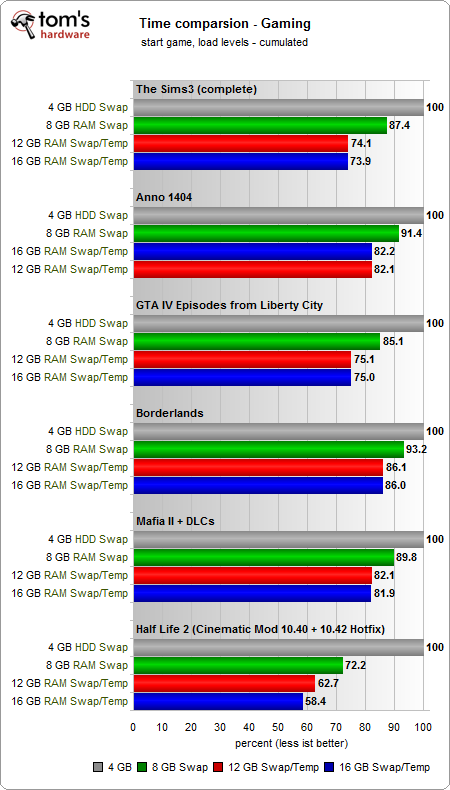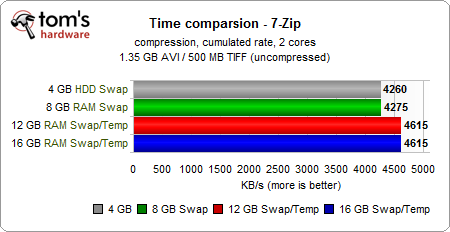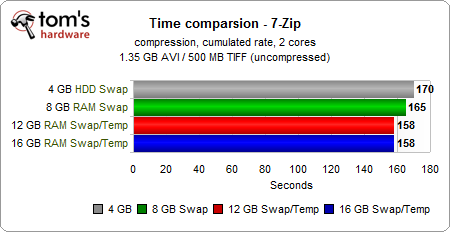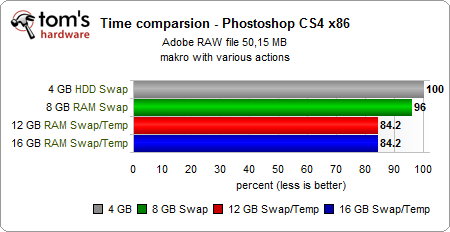Memory Upgrade: Is It Time To Add More RAM?
The price of memory upgrades is at an all-time low. And more memory is always better, right? We decided to analyze whether or not now could be the time for a fat memory upgrade. As it turns out, there are arguments for and against backing up the truck.
Get Tom's Hardware's best news and in-depth reviews, straight to your inbox.
You are now subscribed
Your newsletter sign-up was successful
Benchmark Results: 32-Bit
Part 1 – Gaming
When playing games, the benefits of adding memory space depend on the title. We looked at a few games and averaged the startup times and load times of various levels.
These charts show how much the games make use of the outsourced swap file or the temporary directory. As you can see, the difference between 12 GB and 16 GB of RAM is rather marginal. Half-Life 2 Cinematic Mod is the only game in which 16 GB pulls slightly ahead. The differences observed with large amounts of RAM are pretty much within the margins of error. As you can see, demanding games in a 32-bit environment actually benefit quite a bit from our extended RAM disk swap file.
Unfortunately, we can't measure subjective impressions of in-game frame rates. Especially when the game loads new level areas (GTA IV, Mafia II) during play, or if you pan in the panoramic view (Anno 1404, Sims 3), the impression is much smoother with the larger memory space, and you don't get as much stuttering. Overall frame rates hardly change, but the experience you get while playing, even if entirely subjective, is much smoother.
Part 2: Applications
With applications, we see that benchmark results are dependent on system memory requirements, while the application's subjective user experience also depends on the outsourced temporary dictionaries. As examples, we used a file compression tool and Photoshop.
Once again, a RAM disk-based temporary directory pays off. Overall, looking over our results from the games and applications, we'd say the outcome from using a RAM disk is beneficial.
Get Tom's Hardware's best news and in-depth reviews, straight to your inbox.
Conclusion
Even the 32-bit versions of Windows XP, Vista, and Windows 7 can benefit from 8 GB or more of RAM. Depending on the application, the focus should be on relocating either the swap file or the temporary directories. Given that memory prices are falling again, we recommend an 8, 12, or even 16 gigabyte kit. It's worthwhile to upgrade, even when using a 32-bit version of Windows--especially if you're having to hold off on jumping to a 64-bit OS for some reason.
Current page: Benchmark Results: 32-Bit
Prev Page Up To 16 GB Of RAM On A 32-Bit System! Next Page 64-Bit: Memory-Hungry Graphics Cards?
Igor Wallossek wrote a wide variety of hardware articles for Tom's Hardware, with a strong focus on technical analysis and in-depth reviews. His contributions have spanned a broad spectrum of PC components, including GPUs, CPUs, workstations, and PC builds. His insightful articles provide readers with detailed knowledge to make informed decisions in the ever-evolving tech landscape
-
doyletdude Hmmm... i'm concerned because i use triple channel so i'm currently at 6gb, which is under recommendation however to upgrade to 12gb might be to much, especially since i've heard that using more RAM slots negativley affects overclocking stability.Reply -
hmp_goose I, too, run an X58 chipset, with Win7-64, and don't know what this article is telling me . . .Reply -
holygigi Finally a good read on Tom's, not a news about a rumor that a fruit company might provide a tease about something shiny.Reply
I use 8GB for about 2 years now, the best thing about it (and I didnt find this covered in the article) is that alt+tab-ing out from a game to windows and back to the game is almost instant. Even the hungriest game uses about 3-3.5 GB. Windows again about 2.5. So you always have 2GB free. Even though I dont have a SSD yet, after the initial slower start of an app (browser, anything), going back to it is instant. For me this is the real benefit of having more ram. The marginal (if any) FPS increase is not the main selling point. Multi-tasking is. -
takeapieandrun Personally, I would say 6GB is nice balance between capacity and cost. 4GB of RAM can become limited at times, but IMO 8GB is a little too much.Reply -
dogman_1234 Nice article. I finally learned something i can be able to use later in my computing life.Reply
My questions are as followed:
1) I am aware SSD's are a applied RAM set. So how can one use your system RAM to store files after shutdown as well.
2) How can one add more memory to the GPU? I can see a noticeable jump in GPU RAM, or GMP as they put it. -
coffee_man i use triple channel but i only got 3 gb of ram, is better to add more ram or buy an ssd ?Reply -
Niva Come on guys, the article and recommendation are pretty straight forward. They're recommending a minimum of 8 Gb and if you have less you might want to consider upgrading.Reply
That being said, if all you do is interwebs and some gaming you should be careful where you spend your money. Big ram is for programs that use a lot of ram, if you're doing heavy 3d modeling/animation, large photoshop files now that CS5 actually has 64 bit products it's justified. For games it's a crapshoot.
I say stay with 6 Gb unless you see your ram usage over 50% regualrly. -
quizzical So basically, the conclusion is that slow hard drives are slow, which really doesn't say anything about system memory. What happens if you try running the programs off of a good SSD? Having an SSD in your system, but not putting any programs or even the swap file on it seems like a rather strange configuration.Reply



